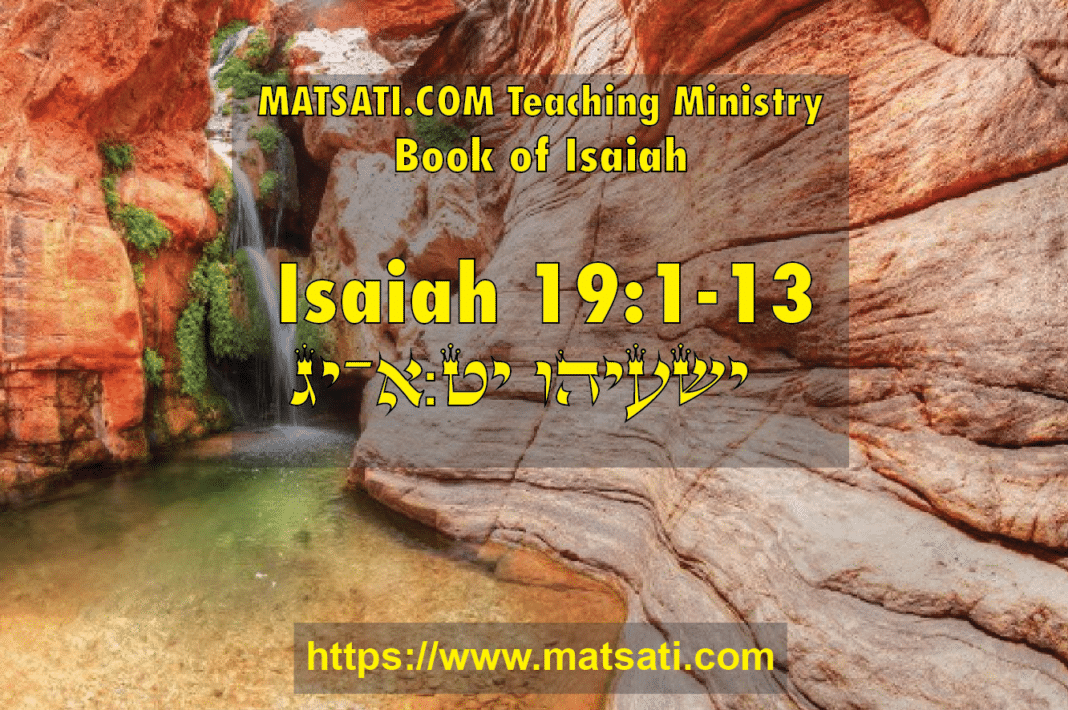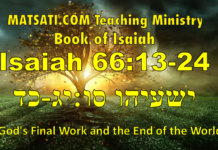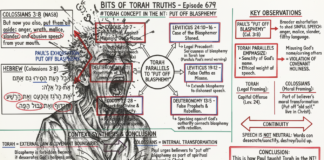Isaiah 19:1-13
Isaiah chapter 19-20 speaks about God’s judgment against Egypt. Note that in Isaiah 30-31 the leaders of Judah were wanting to rely upon Egypt when Assyria was threatening the people, they sought the help of the Egyptian army. We note something about one who places his trust in the Lord God in heaven, He is there for him, to protect him, take care of him, etc. When one places his trust in this world, in physical things, no matter what it is, leads only to emptiness, depression, and great sorrow, and these things will turn on him to enslave him, to place him into bondage. Unrepentant sin always leads to more and more sin, and ultimately to one’s destruction. We note Isaiah speaks of the Lord God being with us according to Isaiah 41:10.
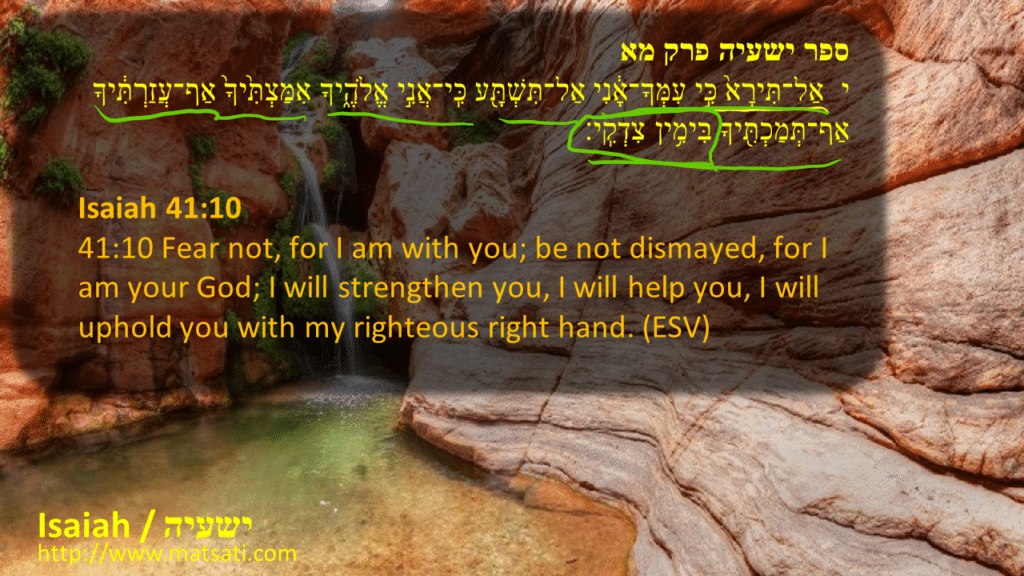
ספר ישעיה פרק מא
י אַל־תִּירָא֙ כִּ֣י עִמְּךָ־אָ֔נִי אַל־תִּשְׁתָּ֖ע כִּֽי־אֲנִ֣י אֱלֹהֶ֑יךָ אִמַּצְתִּ֙יךָ֙ אַף־עֲזַרְתִּ֔יךָ אַף־תְּמַכְתִּ֖יךָ בִּימִ֥ין צִדְקִֽי׃
Isaiah 41:10
41:10 Fear not, for I am with you; be not dismayed, for I am your God; I will strengthen you, I will help you, I will uphold you with my righteous right hand. (ESV)
This phrase אַל־תִּירָא֙ כִּ֣י עִמְּךָ־אָ֔נִי declares the presence of God in our lives and demonstrates why the Lord protects us which is illustrated by two massive hands encircling and guarding his little children or lifting them above destruction. The picture of our Lord holding and shielding us in his hands illustrates how he is caring for us and protecting us. Note that we have the choice to remain in His hands, or to walk in our own ways making bad choices which lead to attack by the enemy. Many times I have heard it said, if God is protecting me why did such and such happen to me? The reason may be due to rebellion in one way or another, or it may be the Lord refining His precious metal (us) to make us into something more pure and holy. Regardless of what is happening in our lives, we must trust in the Lord God Almighty! Whatever we trust in place of God will lead to unhappiness. This is why both Isaiah and Yeshua taught how turning to the Lord will bring peace and joy, and how in Yeshua we receive both the peace and joy of the Lord. Here Isaiah speaks to the issues of trusting in Egypt, how Egypt has nothing to offer the people of Judah and Jerusalem because historically Egypt will betray them. But not just this, the major issue is their trust in Egypt as opposed to trusting in God. In Isaiah 19:1-15 we read how Egypt is utterly helpless before the God in heaven, and in Isaiah 19:16-25 Isaiah speaks of one day Egypt will also worship the Lord God Almighty.
When we examine the commentaries on the book of Isaiah, again we see in the commentaries demonstrating their lack of faith in the authorship of the book of Isaiah. Kaiser states that this is poor poetry, and Alexander states that this chapter is metaphorical, and John Oswalt states that since it does not seem possible to place this chapter in history, it is impossible to prove or disprove Isanianic authorship from the internal evidence. Most commentators are trying to justify the purpose of the chapter by some kind of concrete historical or textual argument. The point of the chapter is however consistent with the overarching theme of Isaiah thus far, to not trust in man (Jeremiah 17:5-10) but to trust in God, to trust in the One who is able to deliver them, who is Lord over all! We note that in the opening verses of Isaiah 19:1-3 that Isaiah speaks to the idolatry of Egypt. This is the primary reason for their coming destruction, just as the idolatry of the Canaanite religion led the people into moral and ethical decay, so too Egyptian polytheism has led to their moral and ethical decay due to the spiritual sources of these idol gods. Note how the pantheon of gods in the Egyptian religion fight amongst themselves for power, this means there is not one that their people can trust in like our One and all powerful God, the Creator of Heaven and Earth. Because of these things concerning Egypt, Isaiah asks why should Judah and Jerusalem trust in this place? Isaiah begins chapter 19 saying the following:
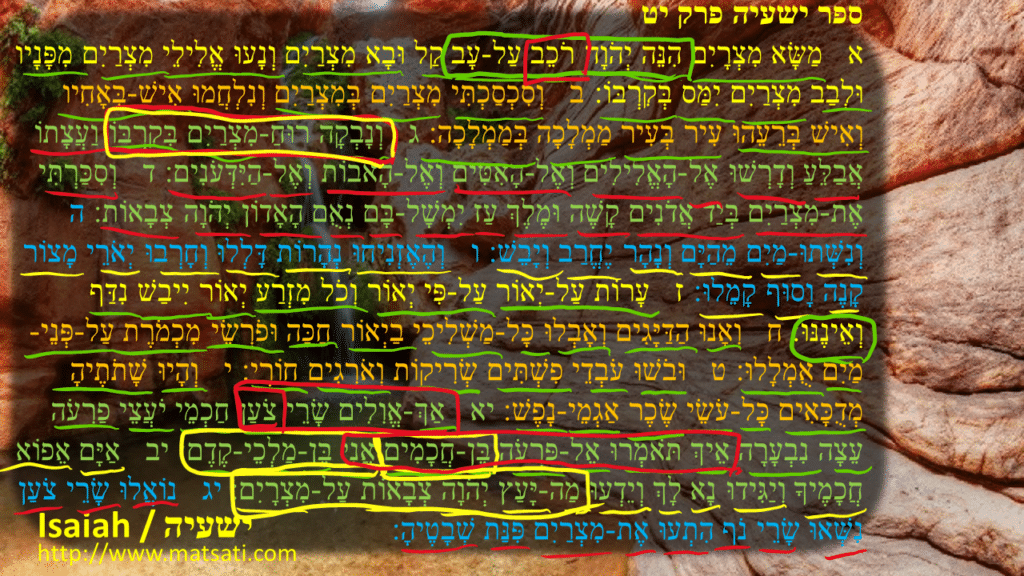
ספר ישעיה פרק יט
א מַשָּׂא מִצְרָיִם הִנֵּה יְהֹוָה רֹכֵב עַל-עָב קַל וּבָא מִצְרַיִם וְנָעוּ אֱלִילֵי מִצְרַיִם מִפָּנָיו וּלְבַב מִצְרַיִם יִמַּס בְּקִרְבּוֹ:
Isaiah 19:1 states, “The burden of Egypt. Behold, the LORD rideth upon a swift cloud, and shall come into Egypt: (מַשָּׂא מִצְרָיִם הִנֵּה יְהֹוָה רֹכֵב עַל-עָב קַל וּבָא מִצְרַיִם) and the idols of Egypt shall be moved at his presence, and the heart of Egypt shall melt in the midst of it. (וְנָעוּ אֱלִילֵי מִצְרַיִם מִפָּנָיו וּלְבַב מִצְרַיִם יִמַּס בְּקִרְבּוֹ)” The opening sentence states הִנֵּה יְהֹוָה רֹכֵב עַל-עָב “behold the Lord riding upon a cloud.” This is a common metaphor for the presence of the Lord. We note that from the Torah perspective, the cloud represented the Shekinah glory of God, the Lord God would literally manifest himself as a cloud of smoke, such that man would not see Him, or else he would die. (See Shemot / Exodus 13:21-22, 1 Kings 8:10-12, Tehillim / Psalm 97:2) When Isaiah speaks of the Lord coming upon the clouds, he is drawing in the Torah perspective on the power, might, and fear of God. In the Pseudepigrapha according to 3 Enoch 24:1-15, there is a lot that may be said about the Lord coming upon the clouds. Note that this phraseology is used also of Baal, the Canaanite storm-god (John Oswalt) and so again there is a parallel to the Canaanite gods by whom the people were deceived. Note that the root word for רֹכֵב “riding” is also used for the word chariot (מרכבה), and this is how 3 Enoch picks up the discussion saying the following:
3 Enoch 24:1-15
James H. Charlesworth, The Old Testament Pseudepigrapha, vol. 1 (New York; London: Yale University Press, 1983), 308–309.
24:1* R. Ishmael said: The angel Meṭaṭron, Prince of the Divine Presence, the glory of highest heaven, said to me: How many chariots has the Holy One, blessed be he? He has the chariots of the cherubim, as it is written, “He mounted a cherub and flew.” 2* He has the chariots of wind, as it is written, “He soared on the wings of the wind.” 3* He has the chariots of swift cloud, as it is written, “See! the Lord comes, riding a swift cloud.” 4* He has the chariots of clouds, as it is written, “I am coming to you in a dense cloud.” 5* He has the chariots of the altar, as it is written, “I saw the Lord standing upon the altar.” 6* He has the chariots of twice ten thousand, as it is written, “The chariots of God are twice ten thousand, thousands of angels.” 7* He has the chariots of the tent, as it is written, “The Lord showed himself in the tent, in a pillar of cloud.” 8* He has the chariots of the tent of meeting, as it is written, “The Lord addressed Moses from the tent of meeting.” 9* He has the chariots of the mercy seat, as it is written, “He heard a voice that spoke to him from above the throne of mercy.” 10* He has the chariots of sapphire stone, as it is written, “Beneath his feet there was, it seemed, a sapphire pavement.” 11* He has the chariots of eagles, as it is written, “I carried you on eagles’ wings.” They are not eagles but fly like eagles. 12* He has the chariots of acclamation, as it is written, “God has gone up in acclamation.” 13* He has the chariots of ʿArabot, as it is written, “Extol him who rides in the ʿArabot.” 14* He has the chariots of clouds, as it is written, “He makes the clouds his chariots.” 15* He has the chariots of the creatures, as it is written, “The creatures ran and returned”—they run by permission and return by permission, for the Šekinah is above their heads.
Third Enoch draws in the Torah perspective speaking of the Lord God riding upon a chariot in the clouds, upon the wind, and asks the question of how many chariots does the Lord have? The descriptions of the chariots are to the altar, the might of 10,000 angels, the tent of meeting, the pillar of cloud, the mercy seat, the bat kol (still small voice) that proceeded from the mercy seat, the sapphire pavement, eagles wings which carried His people, and to the Shekinah glory of God. Notice how 3 Enoch takes everything that is written about the nature and character of God from the Torah! This illustrates the importance of the books of Moshe to our understanding of who God is and how he loves us. (This demonstrates for us how important it is to study the Torah every year.) This love of God is illustrated from the sectarian documents in the DSS (1Q33 Col. xiv) to destroy the idolatry of the nations, and specifically Egyptian idols as it pertains to Isaiah 19:1-25.
DSS 1Q33 Col. xiv
| DSSSE: | EnDSSSE: | TrDSS:NT |
| 1Q33 Col. xiv:1 1 like the fire of his wrath against the idols of Egypt. Blank | 1Q33 Col. xiv:1 1 כאש עברתו באלילי מצרים vacat | 1Q33 Col. xiv:1 1like the fire of His fury against the idols of Egypt.” |
| 1Q33 Col. xiv:2 2 And when they have departed from the slain in order to enter the camp, they shall all sing the hymn of return. In the morning they shall wash their clothes and cleanse themselves | 1Q33 Col. xiv:2 2 ואחר העלותם מעל החללים לבוא המחנה ירננו כולם את תהלת המשוב ובבוקר יכבסו בגדיהם ורחצו | 1Q33 Col. xiv:2 The blessings of the war recited by all the leaders in the morning before the battle. 2After they have withdrawn from the slain to return to the camp, all of them shall sing the hymn of return. In the morning they shall wash their clothes, cleanse themselves |
| 1Q33 Col. xiv:3 3 of the blood of the guilty corpses. They shall go back to the site of their positions, where they arranged the battle line before the slain of the enemy fell. And there they shall all bless | 1Q33 Col. xiv:3 3 מדם פגרי האשמה ושבו אל מקום עומדם אשר סדרו שם המערכה לפני נפול חללי האויב וברכו שם | 1Q33 Col. xiv:3 3of the blood of the sinful bodies, and return to the place where they had stood, where they had formed the battle line before the slain of the enemy fell. There they shall all bless |
| 1Q33 Col. xiv:4 4 the God of Israel and exalt his name in joyful chorus. They shall begin to speak and say: «Blessed be the God of Israel, the one who keeps mercy for his covenant and pledges of | 1Q33 Col. xiv:4 4 כולם את אל ישראל ורוממו שמו ביחד שמחה וענו ואמרו ברוך אל ישראל השומר חסד לבריתו ותעודות | 1Q33 Col. xiv:4 4the God of Israel and joyously exalt His name together. They shall say in response: “Blessed is the God of Israel, who guards loving-kindness for His covenant and the appointed times |
| 1Q33 Col. xiv:5 5 deliverance for the people he has redeemed. He has called those who are tottering to wondrous [exploits], and has gathered the assembly of peoples for destruction with no remnant, in order to raise up in justice | 1Q33 Col. xiv:5 5 ישועה לעם פדותו ויקרא כושלים ל[גבורו]ת פלא וקהל גויים אסף לכלה אין שארית ולהריס במשפט | 1Q33 Col. xiv:5 5of salvation for the people He redeems. He has called those who stumble unto wondrous [accomplishment]s, and He has gathered a congregation of nations for annihilation without remnant in order to raise up in judgment |
The DSS speaks to the faith of the author of this text concerning the sovereignty of God over all things, over creation, over the nations, over men and their false gods. The DSS (1Q33 Col. xiv) speaks of the destruction that comes to both a nation and its false gods due to the wrath of God, and to His people who rejoice over the victory the Lord has brought in their lives. The DSS speaks of this as being salvation for the people whom the Lord redeems. The Egyptians will be as dead as their idols, the Exodus illustrated the power of God and His superiority over their gods (Shemot / Exodus 12:12). We note the DSS states “Blessed be the God of Israel, the one who keeps mercy for his covenant” indicates the faithfulness of the God who can be trusted. Those who place their trust in Him are made strong and do not have to be afraid.
ספר ישעיה פרק יט
ב וְסִכְסַכְתִּי מִצְרַיִם בְּמִצְרַיִם וְנִלְחֲמוּ אִישׁ-בְּאָחִיו וְאִישׁ בְּרֵעֵהוּ עִיר בְּעִיר מַמְלָכָה בְּמַמְלָכָה:
Isaiah 19:2 states, “And I will set the Egyptians against the Egyptians: (וְסִכְסַכְתִּי מִצְרַיִם בְּמִצְרַיִם) and they shall fight every one against his brother, and every one against his neighbor; (נִלְחֲמוּ אִישׁ-בְּאָחִיו וְאִישׁ בְּרֵעֵהוּ) city against city, and kingdom against kingdom. (עִיר בְּעִיר מַמְלָכָה בְּמַמְלָכָה)” Here it appears that the Lord God Himself will provoke the nation, the people to become quarrelsome with one another to fight and be disconnected from his neighbor, etc. John Oswalt writes, “Throughout her history Egypt was especially prone to this kind of dissolution. After the six strong dynasties of the Old Kingdom (3000–2200 B.C.), there came a two-hundred-year period when each of the 42 nomes (city-states) became a country unto itself and general chaos reigned. Then the Twelfth Dynasty united the land for about two hundred years (1990–1785 B.C.), but again chaos took over for two centuries.” Egyptian history appears to cycle between these two states. It could be due to the pantheon of gods in Egyptian religion, and the Pharaoh being considered a god, and this may have led to the fragmentation due to the cruelty of the kings. We remember what was said concerning Damascus, how at each street corner there was an idol god, and how Israel took and combined these all into one and worshiped them. The individual city provinces may too have had their own assortment of gods, which would lead to a more fragmented nation. When the Lord God passes judgment upon a nation, especially one like this to fight amongst themselves, the only solution is to perform Teshuvah (Repentance) and return to the Lord.
ספר ישעיה פרק יט
ג וְנָבְקָה רוּחַ-מִצְרַיִם בְּקִרְבּוֹ וַעֲצָתוֹ אֲבַלֵּעַ וְדָרְשׁוּ אֶל-הָאֱלִילִים וְאֶל-הָאִטִּים וְאֶל-הָאֹבוֹת וְאֶל-הַיִּדְּעֹנִים: ד וְסִכַּרְתִּי אֶת-מִצְרַיִם בְּיַד אֲדֹנִים קָשֶׁה וּמֶלֶךְ עַז יִמְשָׁל-בָּם נְאֻם הָאָדוֹן יְהֹוָה צְבָאוֹת:
Isaiah 19:3 states, “And the spirit of Egypt shall fail in the midst thereof; (וְנָבְקָה רוּחַ-מִצְרַיִם בְּקִרְבּוֹ) and I will destroy the counsel thereof: and they shall seek to the idols, (וַעֲצָתוֹ אֲבַלֵּעַ וְדָרְשׁוּ אֶל-הָאֱלִילִים) and to the charmers, and to them that have familiar spirits, and to the wizards. (וְאֶל-הָאִטִּים וְאֶל-הָאֹבוֹת וְאֶל-הַיִּדְּעֹנִים)” Isaiah 19:4 “And the Egyptians will I give over into the hand of a cruel lord; (וְסִכַּרְתִּי אֶת-מִצְרַיִם בְּיַד אֲדֹנִים קָשֶׁה) and a fierce king shall rule over them, saith the Lord, the LORD of hosts. (וּמֶלֶךְ עַז יִמְשָׁל-בָּם נְאֻם הָאָדוֹן יְהֹוָה צְבָאוֹת)” Here Isaiah states וְנָבְקָה רוּחַ-מִצְרַיִם בְּקִרְבּוֹ “the spirit of Egypt will fail in the midst of him.” Note that in the Tanakh, the word רוּחַ is not used to refer to the breath of a person, starting with Bereshit / Genesis 3 the Neshamah is the description of breath. In addition, there is a distinction between רוּחַ and נפש which נפש refers to a personal soul, of which if the נפש was removed from a man he would die. In all pre-exilic literature in the Tanakh (pre-babylonian exile) the רוּחַ is not used for the personal soul. The רוּחַ functions as an invading spirit or a deceiving spirit according to the pre-exilic literature from the Tanakh. The רוּחַ according to Tehillim / Psalms and Mishley / Proverbs David and Solomon parallel the רוּחַ with the נפש, and by the time of Ezekiel, we find the רוּחַ being used to denote the normal breath-soul (Ezekiel 37:5-8). Post exile the רוּחַ follows a similar development as נפש, it is used as parallelism. (George Gray) The point of this discussion is what we read here in Isaiah, the phrase וְנָבְקָה רוּחַ-מִצְרַיִם בְּקִרְבּוֹ “the spirit of Egypt will fail in the midst of him” being synonymous to that idolatrous invading spirit failing the people. A complementary understanding is found in the Pseudepigrapha, Testament of Judah 23.1-24.5 concerning these things.
Pseudepigrapha, Testament of Judah 23.1-24:5
23:1 “My grief is great, my children, on account of the licentiousness and witchcraft and idolatry that you practice contrary to the kingship, following ventriloquists, omen dispensers, and demons of deceit. 2 You shall make your daughters into musicians and common women, and you will become involved in revolting gentile affairs. 3 In response to this the Lord will bring you famine and plague, death and the sword, punishment by a siege, scattering by enemies like dogs, the scorn of friends, destruction and putrefaction of your eyes, slaughter of infants, the plunder of your sustenance, the rape of your possessions, consumption of God’s sanctuary by fire, a desolate land, and yourselves enslaved by the gentiles. 4 And they shall s castrate some of you as eunuchs for their wives, 5 until you return to the Lord in integrity of heart, penitent and living according to all the Lord’s commands. Then the Lord will be concerned for you in mercy and will free you from captivity under your enemies. 24:1 “And after this there shall arise for you a Star from Jacob in peace: And a man shall arise from my posterity like the Sun of righteousness, walking with the sons of men in gentleness and righteousness, and in him will be found no sin. 2* And the heavens will be opened upon him to pour out the spirit as a blessing of the Holy Father. 3* And he will pour the spirit of grace on you. And you shall be sons in truth, and you will walk in his first and final decrees. 4 This is the Shoot of God Most High; this is the fountain for the life of all humanity. 5 Then he will illumine the scepter of my kingdom, 6 and from your root will arise the Shoot, and through it will arise the rod of righteousness for the nations, to judge and to save all that call on the Lord.
The Testament of Judah in chapter 23 opens with the great grief God has towards His people on account of licentiousness, witchcraft, and idolatry that according to Judah are practices that are contrary to the kingship of God. The Pseudepigrapha goes on speaking of these practices, which include demons of deceit which speaks to what is taking place in the sense of idolatry. Because of the unrepentant sin, the Lord will bring famine, plague, death, and the sword which is consistent with what we are reading according to the book of Isaiah. In T.Judah 24 we read of an Messianic expectation of the Lord raising up a star from Jacob for peace and righteousness. Again remember how in the act of idolatry, one is worshiping demons, remember the Torah perspective according to Devarim / Deuteronomy 32:16-17.
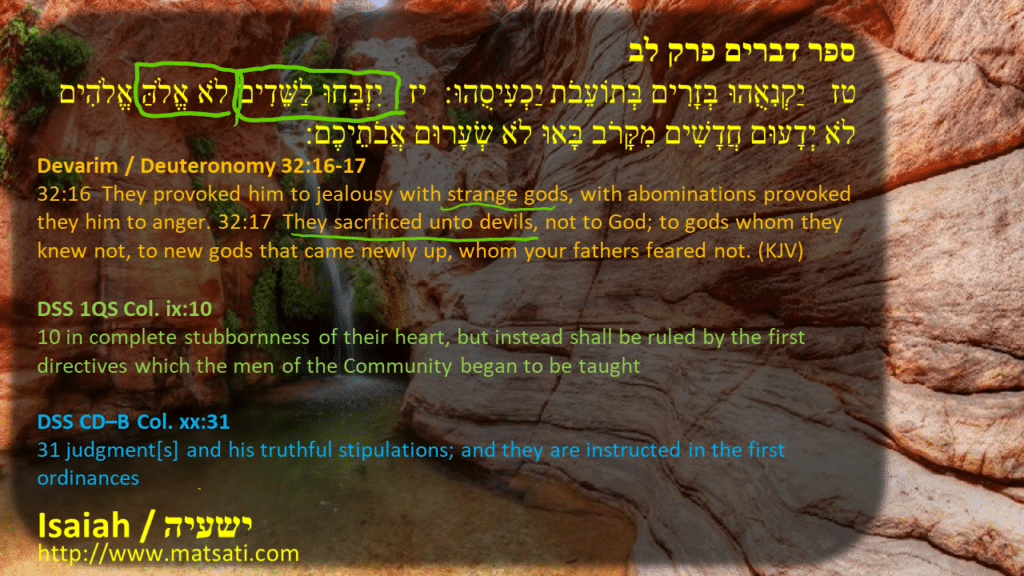
ספר דברים פרק לב
טז יַקְנִאֻהוּ בְּזָרִים בְּתוֹעֵבֹת יַכְעִיסֻהוּ: יז יִזְבְּחוּ לַשֵּׁדִים לֹא אֱלֹהַּ אֱלֹהִים לֹא יְדָעוּם חֲדָשִׁים מִקָּרֹב בָּאוּ לֹא שְֹעָרוּם אֲבֹתֵיכֶם:.
Devarim / Deuteronomy 32:16-17
32:16 They provoked him to jealousy with strange gods, with abominations provoked they him to anger. 32:17 They sacrificed unto devils, not to God; to gods whom they knew not, to new gods that came newly up, whom your fathers feared not. (KJV)
The Torah itself points out this perspective we see here in T.Judah 23 and in the book of Isaiah 19:1-4. Remember Vayikra / Leviticus 17:7 (וְלֹא־יִזְבְּח֥וּ עוֹד֙ אֶת־זִבְחֵיהֶ֔ם לַשְּׂעִירִ֕ם אֲשֶׁ֛ר הֵ֥ם זֹנִ֖ים אַחֲרֵיהֶ֑ם חֻקַּ֥ת עוֹלָ֛ם תִּֽהְיֶה־זֹּ֥את לָהֶ֖ם לְדֹרֹתָֽם׃) also points this out concerning idolatry. The apostle Paul also validates this interpretation concerning the association between idols and demons in his letters to the Corinthians, saying, “…what pagans sacrifice they offer to demons and not to God. I do not want you to be participants with demons” (1 Corinthians 10:20). Paul also says that an idol is nothing to those who are in Christ (1 Corinthians 8:4). Idolatry is the participation with demons, and this is not a fabrication on interpretation of these scriptures. In the coming of the Messiah Yeshua, we remember following the resurrection of Yeshua the outpouring of the Spirit of God upon His people. There may be a similar phenomenon in the spirit of idols, these demonic forces falling upon the people who serve and worship them. They will let the people down, just as Isaiah states וְנָבְקָה רוּחַ-מִצְרַיִם בְּקִרְבּוֹ “the spirit of Egypt will fail in the midst of him.” The natural outcome is what Isaiah says according to Isaiah 19:2, “And I will set the Egyptians against the Egyptians: (וְסִכְסַכְתִּי מִצְרַיִם בְּמִצְרַיִם) and they shall fight every one against his brother, and every one against his neighbor; (נִלְחֲמוּ אִישׁ-בְּאָחִיו וְאִישׁ בְּרֵעֵהוּ) city against city, and kingdom against kingdom. (עִיר בְּעִיר מַמְלָכָה בְּמַמְלָכָה).” The DSS 1QS 9.10 and CD 20.31 mention parallel thought concerning the leadership saying:
DSS 1QS Col. ix:10
10 in complete stubbornness of their heart, but instead shall be ruled by the first directives which the men of the Community began to be taught
DSS CD–B Col. xx:31
31 judgment[s] and his truthful stipulations; and they are instructed in the first ordinances,
The Egyptian gods are ready to oppress the people in sin and rebellion. Only by faith and trust in the God in heaven, the God of Israel and His Messiah Yeshua can people be delivered from sin and death. Isaiah 19:3 goes on saying וְדָרְשׁוּ אֶל-הָאֱלִילִים וְאֶל-הָאִטִּים וְאֶל-הָאֹבוֹת וְאֶל-הַיִּדְּעֹנִים “and they shall seek to the idols, and to the charmers, and to them that have familiar spirits, and to the wizards.” Those who do such things come into direct contact with the evil spirits involved in these things. This is why Isaiah continues saying, וְסִכַּרְתִּי אֶת-מִצְרַיִם בְּיַד אֲדֹנִים קָשֶׁה וּמֶלֶךְ עַז יִמְשָׁל-בָּם נְאֻם הָאָדוֹן יְהֹוָה צְבָאוֹת “And the Egyptians will I give over into the hand of a cruel lord; and a fierce king shall rule over them, saith the Lord, the LORD of hosts.” The kings who are involved in idolatry encourage the people to do the same, and to obtain the same demonic spirit that is received in the practice of idol worship. The pantheon of gods, their fighting factions, the underlying demonic forces that are at work, these things lead to a fragmented and discontented people. Only in the unity that the God of Israel provides in the Messiah Yeshua can a nation be united, and peace brought to all peoples. This truth follows what we read in Isaiah 2:4-5 on how all of the nations will be united joined together flowing to mount Zion, to God’s holy mountain, to learn His holy and righteous ways.
ספר ישעיה פרק יט
ה וְנִשְּׁתוּ-מַיִם מֵהַיָּם וְנָהָר יֶחֱרַב וְיָבֵשׁ: ו וְהֶאֶזְנִיחוּ נְהָרוֹת דָּלְלוּ וְחָרְבוּ יְאֹרֵי מָצוֹר קָנֶה וָסוּף קָמֵלוּ:
Isaiah 19:5 states, “And the waters shall fail from the sea, and the river shall be wasted and dried up. (וְנִשְּׁתוּ-מַיִם מֵהַיָּם וְנָהָר יֶחֱרַב וְיָבֵשׁ)” Isaiah 19:6 “And they shall turn the rivers far away; and the brooks of defense shall be emptied and dried up: the reeds and flags shall wither. (וְהֶאֶזְנִיחוּ נְהָרוֹת דָּלְלוּ וְחָרְבוּ יְאֹרֵי מָצוֹר קָנֶה וָסוּף קָמֵלוּ)” Isaiah moves to the thing upon which the Egyptians have their hope, the Nile River. Here he says the river will be dried up. Note how Egypt is completely dependent upon the waters of the Nile since this region is a desert region with little rain. We note how in Parashat Vayera the mountainous region of Israel Abraham chose to remain, while Lot chose the low lying and well watered land. The reason being that Abraham had faith since the land in that region needed rain from heaven, and Lot (analogy: lack of faith chose the low lying land) due to his choices lost everything that he had to that sinful place. There is another analogy to ascending and descending, Abraham chose to remain in the high place, nearer to the Lord, whereas Lot chose the low place, which is farther away. Similarly, Egypt should remember the God in heaven, the God of Israel because He is the one who brings the rains, or even the annual floods of the Nile which water the land.
ספר ישעיה פרק יט
ז עָרוֹת עַל-יְאוֹר עַל-פִּי יְאוֹר וְכֹל מִזְרַע יְאוֹר יִיבַשׁ נִדַּף וְאֵינֶנּוּ:
Isaiah 19:7 states, “The paper reeds by the brooks, by the mouth of the brooks, and everything sown by the brooks, shall wither, be driven away, and be no more. (עָרוֹת עַל-יְאוֹר עַל-פִּי יְאוֹר וְכֹל מִזְרַע יְאוֹר יִיבַשׁ נִדַּף וְאֵינֶנּוּ)” Here Isaiah 19:7 is coupled to the previous two verses (Isaiah 19:5-6) stating that the rivers will dry up and everything sown (מִזְרַע) will wither (יִיבַשׁ) and be no more (וְאֵינֶנּוּ). We note the major exports of Egypt are its grain and flax, and this is further illustrated from the NT text we read according to Acts 28:11 that Paul was traveling upon a grain-ship from Egypt. If the Nile was cut off, it would be because of the people’s unrepentant sin, and as the T.Judah 23 states, on account of their licentiousness, witchcraft, and idolatry.
ספר ישעיה פרק יט
ח וְאָנוּ הַדַּיָּגִים וְאָבְלוּ כָּל-מַשְׁלִיכֵי בַיְאוֹר חַכָּה וּפֹרְשֵֹי מִכְמֹרֶת עַל-פְּנֵי-מַיִם אֻמְלָלוּ: ט וּבֹשׁוּ עֹבְדֵי פִשְׁתִּים שְֹרִיקוֹת וְאֹרְגִים חוֹרָי: י וְהָיוּ שָׁתֹתֶיהָ מְדֻכָּאִים כָּל-עֹשֵֹי שֶֹכֶר אַגְמֵי-נָפֶשׁ:
Isaiah 19:8 states, “The fishers also shall mourn, and all they that cast angle into the brooks shall lament, and they that spread nets upon the waters shall languish. (וְאָנוּ הַדַּיָּגִים וְאָבְלוּ כָּל-מַשְׁלִיכֵי בַיְאוֹר חַכָּה וּפֹרְשֵֹי מִכְמֹרֶת עַל-פְּנֵי-מַיִם אֻמְלָלוּ)” Isaiah 19:9 “Moreover they that work in fine flax, and they that weave networks, shall be confounded. (וּבֹשׁוּ עֹבְדֵי פִשְׁתִּים שְֹרִיקוֹת וְאֹרְגִים חוֹרָי:)” Isaiah 19:10 “And they shall be broken in the purposes thereof, all that make sluices and ponds for fish. (וְהָיוּ שָׁתֹתֶיהָ מְדֻכָּאִים כָּל-עֹשֵֹי שֶֹכֶר אַגְמֵי-נָפֶשׁ)” The narrative continues with the consequences of the drying Nile, the plant life dies, the fish are no more, indicated by the fishermen languishing, and those who export flax and weave will lose their form of income and work. All of these things resulted from their refusal to repent and seek the God of Israel. We note that pride plays a large part in this due to not being willing to humble oneself and believe the truth.
ספר ישעיה פרק יט
יא אַךְ-אֱוִלִים שָֹרֵי צֹעַן חַכְמֵי יֹעֲצֵי פַרְעֹה עֵצָה נִבְעָרָה אֵיךְ תֹּאמְרוּ אֶל-פַּרְעֹה בֶּן-חֲכָמִים אֲנִי בֶּן-מַלְכֵי-קֶדֶם: יב אַיָּם אֵפוֹא חֲכָמֶיךָ וְיַגִּידוּ נָא לָךְ וְיֵדְעוּ מַה-יָּעַץ יְהֹוָה צְבָאוֹת עַל-מִצְרָיִם:
Isaiah 19:11 states, “Surely the princes of Zoan are fools, the counsel of the wise counsellors of Pharaoh is become brutish: (אַךְ-אֱוִלִים שָֹרֵי צֹעַן חַכְמֵי יֹעֲצֵי פַרְעֹה עֵצָה נִבְעָרָה) how say ye unto Pharaoh, I am the son of the wise, the son of ancient kings? (אֵיךְ תֹּאמְרוּ אֶל-פַּרְעֹה בֶּן-חֲכָמִים אֲנִי בֶּן-מַלְכֵי-קֶדֶם)” Isaiah 19:12 “Where are they? where are thy wise men? (אַיָּם אֵפוֹא חֲכָמֶיךָ) and let them tell thee now, and let them know what the LORD of hosts hath purposed upon Egypt. (וְיַגִּידוּ נָא לָךְ וְיֵדְעוּ מַה-יָּעַץ יְהֹוָה צְבָאוֹת עַל-מִצְרָיִם)” So there are a number of things that we can observe from these two verses. The first is about man’s wisdom, here in Egypt the wisdom of kings is found in their polytheistic religion. The second is the pride of Egypt, found in her wealth, through her exports and agricultural wealth, and Isaiah’s question, מַה-יָּעַץ יְהֹוָה צְבָאוֹת עַל-מִצְרָיִם “what is the Lord of hosts plan for Egypt?” The idea is that the God of Israel is able to frustrate the plans of the Egyptian kings, especially since the Egyptian gods are helpless in the sight of God since they are nothing more than demonic forces. The phrase אַךְ-אֱוִלִים שָֹרֵי צֹעַן speaks of the foolishness of the princes of Zoan. Comparing the MSS with the LXX and TgJ we get the following:
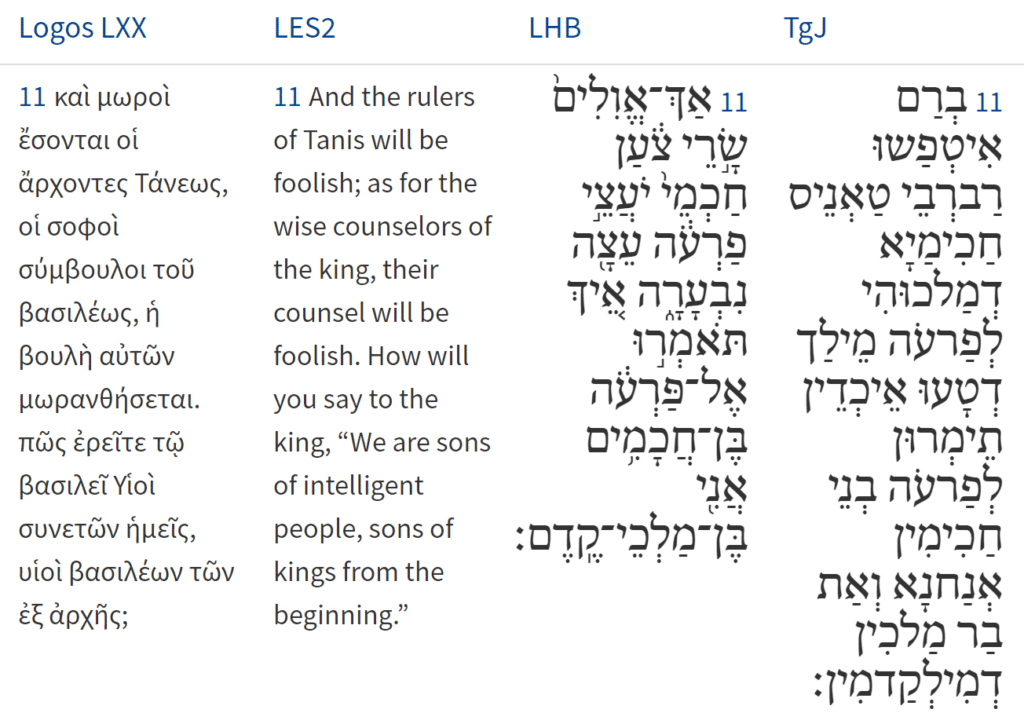
Note how the LXX translates as ἄρχοντες Τάνεως “Rulers of Tanis” a place in the northern part of the Nile Delta. The Targums Jonathan and Neofiti also translate רַברְבֵי טַאְנֵיס “Teachers of Tanis.” Tanis (Τάνις) is the Greek name for an Egyptian city known in Hebrew as Zoan.
Zoan (צֹעַן) is an ancient city on the northeastern Nile delta in Egypt, near the southern shore of Lake Menzaleh, modern-day San el-Hagar. Zoan is also referred to in extra biblical literature by its Greek name, Tanis (Τανίς). Zoan’s location on the Nile delta places it in close proximity to Goshen, the region where the Hebrew slaves lived in Egypt prior to the exodus. The writer of Tehillim / Psalms 78 identifies Zoan as the location from which God performed at least some of the miracles in Exodus, possibly including all the 10 plagues on Egypt (see Tehillim / Psalms 78:12, 78:43, and Shemot / Exodus 7:14-12:30). When the Egyptian nation was split into two Tanis became the capital city. Isaiah’s statement, אֵיךְ תֹּאמְרוּ אֶל-פַּרְעֹה בֶּן-חֲכָמִים אֲנִי appears to suggest surprise by Isaiah how people could continue to trust in the plans of the Egyptians. The DSS 4Q163 Frag. 8-19 has some additional insights into the text here from Isaiah 19:10-11.
DSS 4Q163 Frag. 8-19 on Isaiah 19
| 4Q163 Frags. 8–10:8 8 [as it is writ]ten in the book of Zechariah: Zech 3:9 [See, I will] en[grave its inscription, oracle of YHWH] 4Q163 Frags. 8–10:9 9 [of Hosts.] Blank […] 4Q163 Frag. 11 ii:2 2 laborers knocked [down. How deranged the princes of Zoan; the wise advise] 4Q163 Frag. 11 ii:3 3 Pharaoh with [inane] advice. [How can you say to Pharaoh: We are sons of wise men,] 4Q163 Frag. 11 ii:4 4 we are sons of [ancient] kin[gs? Where are your wise men? Let them announce] 4Q163 Frag. 11 ii:5 5 you, [so that they know what YHWH of Hosts is planning against Egypt.] 4Q163 Frags. 15–16 Frags. 15–16 Isa 29:10–12 [For] 4Q163 Frags. 15–16:1 1 YHWH has poured [upon] you [a spirit of de]ep stupor and he has closed [your eyes—the prophets—and] 4Q163 Frags. 15–16:2 2 he has covered your [h]eads—the seers—. For you the vi[sion of this all] has become [like the words of a] 4Q163 Frags. 15–16:3 3 [sea]led [book,] which one [gives] to someone who can read, te[lling him: Please read this,] 4Q163 Frags. 15–16:4 4 [and he answers: I cannot be]cause [it is] se[aled;] and when one gives the boo[k to someone who cannot read] 4Q163 Frags. 18–19 Frags. 18–19 4Q163 Frags. 18–19:1 1 Isa 29:18–23 [words of a book;] without darkness or glo[om the eyes of the blind will see. The oppressed will rejoice even more in YHWH] | 4Q163 Frags. 8–10:8 8 [כאשר כת]וב בספר זכריה מפ[תח פתחה נאום יהוה] 4Q163 Frags. 8–10:9 9 [צבאות] vacat […] 4Q163 Frag. 11 ii:2 2 שכר אגמ[י נפש אך אולים שרי צוען חכמי יועצי] 4Q163 Frag. 11 ii:3 3 פרעוה עצ[ה נבערה איך תואמרו אל פרעוה בני חכמים] 4Q163 Frag. 11 ii:4 4 אנו בני מל[כי קדם אים אפוא חכמיכה ויגידו נא] 4Q163 Frag. 11 ii:5 5 לכה[ וידעו מה יעץ יהוה צבאות על מצרים] 4Q163 Frags. 15–16 Frags. 15–16 4Q163 Frags. 15–16:1 1 [עליכ]מה יהוה [רוח ת]רדמה ויעצם את[ עיניכמה את הנביאים] 4Q163 Frags. 15–16:2 2 [ואת ר]אשיכמה הה[וזים ]כסה ותהי לכמה ח[זות הכול כדברי] 4Q163 Frags. 15–16:3 3 [הספר הח]תום אשר [יתנו א]ותו אל יודע ספר לא[מור קרא נא זה] 4Q163 Frags. 15–16:4 4 [ואמר לוא אוכל כ]יא ח[תום הוא] ונתן הספ[ר על אשר לוא ידע ספר] 4Q163 Frags. 18–19 Frags. 18–19 4Q163 Frags. 18–19:1 1 [דברי ספר] ומאופל ומח[ושך עיני עורים תראינה ויספו ענוים ביהוה] |
According to the fragmented text of the DSS on Isaiah, the princes of Zoan are considered deranged, the Lord God pours upon them the spirit of deep stupor and has closed their eyes. These wise men and wizards and such are those same one’s described in the DSS 1QapGen ar Col. xx:19-23. (See Bereshit / Genesis 12)
DSS 1QapGen ar Col. xx:19-23
Florentino Garcı́a Martı́nez and Eibert J. C. Tigchelaar, “The Dead Sea Scrolls Study Edition (translations)” (Leiden; New York: Brill, 1997–1998), 43.
19 for all the wise men [of] Egypt to be called, and all the wizards as well as all the healers of Egypt, (to see) whether they could heal him of that disease, (him) and the members
20 of his household. However, all the healers and wizards and all the wise men were unable to rise up to heal him. For the spirit attacked all of them
21 and they fled. Blank Then Hirqanos came to me and asked me to come and pray for
22 the king, and lay my hands upon him so that he would recover. For he had seen [me] in a [dr]eam. But Lot said to him: Abram, my uncle, cannot pray for
23 the king while Sarai, his wife, is with him. Go, now, and tell the king to send back his wife to her own husband and he will pray for him and he will recover.
In this rendition of the Genesis story, Pharaoh contacted Lot because his physicians and magicians couldn’t heal him, “For the spirit attacked all of them.” We note how the Lord sent this evil spirit to cause harm due to Sarai. Here in Isaiah 19, Isaiah speaks directly about Pharaoh, his magicians and wisemen, even with a little sarcasm for their gods are unable to save them. The point is that these wise men claim to have ancient wisdom, it doesn’t matter how secure one’s plans may be, if those plans are against the Lord they will not succeed. Yet Judah and Jerusalem are trusting in Egypt.
ספר ישעיה פרק יט
יג נוֹאֲלוּ שָֹרֵי צֹעַן נִשְּׁאוּ שָֹרֵי נֹף הִתְעוּ אֶת-מִצְרַיִם פִּנַּת שְׁבָטֶיהָ:
Isaiah 19:13 states, “The princes of Zoan are become fools, the princes of Noph are deceived; (נוֹאֲלוּ שָֹרֵי צֹעַן נִשְּׁאוּ שָֹרֵי נֹף) they have also seduced Egypt, even they that are the stay of the tribes thereof. (הִתְעוּ אֶת-מִצְרַיִם פִּנַּת שְׁבָטֶיהָ)” Here Isaiah continues the narrative stating נוֹאֲלוּ שָֹרֵי צֹעַן נִשְּׁאוּ שָֹרֵי נֹף “the princes of Zoan are become fools, the princes of Noph are deceived” indicating how the leadership of Egypt are the ones who are leading the people astray. Their wisdom is from this world and not from above. The wisdom of this world is foolishness, and this is why Solomon wrote that the fear of the Lord is the beginning of wisdom (Mishley / Proverbs 1:7). Note what Isaiah says later on according to Isaiah 28:16.
ספר ישעיה פרק כח
טז לָכֵן כֹּה אָמַר אֲדֹנָי יְהֶוִֹה הִנְנִי יִסַּד בְּצִיּוֹן אָבֶן אֶבֶן בֹּחַן פִּנַּת יִקְרַת מוּסָד מוּסָּד הַמַּאֲמִין לֹא יָחִישׁ:
Isaiah 28:16
28:16 Therefore thus saith the Lord God, Behold, I lay in Zion for a foundation a stone, a tried stone, a precious cornerstone, a sure foundation: he that believeth shall not make haste. (KJV)
Here the Lord God Almighty states that he establishes a foundation stone in Zion. This stone is concerning truth, and the NT text interprets this as the foundation upon which the Lord establishes all things is upon His Holy Word, and that word became flesh (John 1:14) and so that foundation is the Messiah (Christ). Without this foundation of Mashiakh, there is no unifying factor in all of creation. It is this unity that we read about according to the NT which speaks of us as believers, we are to reflect the love and unity we have been made betzelem haElohim (in the image of God), demonstrating God’s mercy and love towards each other and the world for the purpose of those who do not know the Lord will place their faith in Him.
Rabbinic Commentary
תרגום יונתן בן עוזיאל אל ישעיה פרק יט:א-יג
א מַטַל כָס דִלוָט לְאַשקָאָה יָת מִצרָיִם הָא יוי מִתגְלֵי בַעְנַן יְקָרֵיה לְאִתפְרָעָא מִן מִצרָאֵי וְיִתַברוּן טָעְוָת מִצרָאֵי מִן קֳדָמֹוהִי וְלִיבָא דְמִצרָאֵי יִתמְסֵי בִמעֵיהֹון׃ ב וַאְגָרֵי מִצרָאֵי בְמִצרָאֵי וִיגִיחוּן קְרָב גְבַר בַאְחוּהִי וּגבַר בְחַברֵיה קְרֵי בִקרֵי מַלכוּ בְמַלכוּ׃ ג וְתִתמְסֵי רוּחָא דְמִצרָאֵי בִמעֵיהֹון וְחַכִימֵיהֹון אְסַלעֵים וְיִתבְעוּן מִן טָעְוָן וּמִן חָרָשִין וּמִן בִדִין וּמִן זְכוּרוּ׃ ד וְאַמסַר יָת מִצרָאֵי בְיַד רִיבֹון קְשֵי וּמַלַך תַקִיף יִשלֹוט בְהֹון אְמַר רִבֹון עָלְמָא יוי צְבָאֹות׃ ה וִיצַדֹון מַיָא מִיַמָא וְנַהרְהֹון יִחרוּב וְיִיבַש׃ ו וִיצַדֹון נַהרָוָותָא יִיבְשוּן וְיִחרְבוּן נַהרֵיהֹון עַמִיקַיָא קְנֵי וְגֹומַא לָא יִסְקוּן׃ ז יִיבַש רוּבֵיה דְנַהרָא וִיהֵי כְכֵיפֵיה וְכָל בֵית מִזרַע נַהרְהֹון יִיבַש יִחרוּב וְלָא יְצַמַח׃ ח וִיצַדֹון צַיָידֵי נוּנַייָא וְיִתאַבְלוּן כָל דַהְוֹו רָמַן בְנַהרָא חַכְתָא וּפָרְסֵי מְצָדַן עַל אַפֵי מַיָא יִצדֹון׃ ט וְיִבַהתוּן פָלְחֵי כִיתָנָא דְסָרְקִין וּמָחַן מִנֵיה מְצָדַן׃ י וִיהֵי אְתַר בֵית שָתֵי מַהָא כְבִישִין אְתַר דַהְוֹו עָבְדִין סִיכְרָא וְכָנְשִין מַיָא גְבַר לְנַפשֵיה׃ יא בְרַם אִיטְפַשוּ רַברְבֵי טַאְנֵיס חַכִימַיָא דְמַלכוּהִי לְפַרעֹה מֵילַך דְטָעוּ אֵיכְדֵין תֵימְרוּן לְפַרעֹה בְנֵי חַכִימִין אְנַחנָא וְאַת בַר מַלכִין דְמִילְקַדמִין׃ יב אָן אִינוּן חַכִימָך וִיחַוֹון כְעַן לָך וְיִדְעוּן מָא מְלַך יוי צְבָאֹות עַל מִצרָיִם׃ יג אִיטְפַשוּ רַברְבֵי טַאְנֵיס טְעֹו אְנָש מַפֵיס אַטעִיאוּ יָת מִצרָיִם רַבָנֵי פִלכַהָא׃
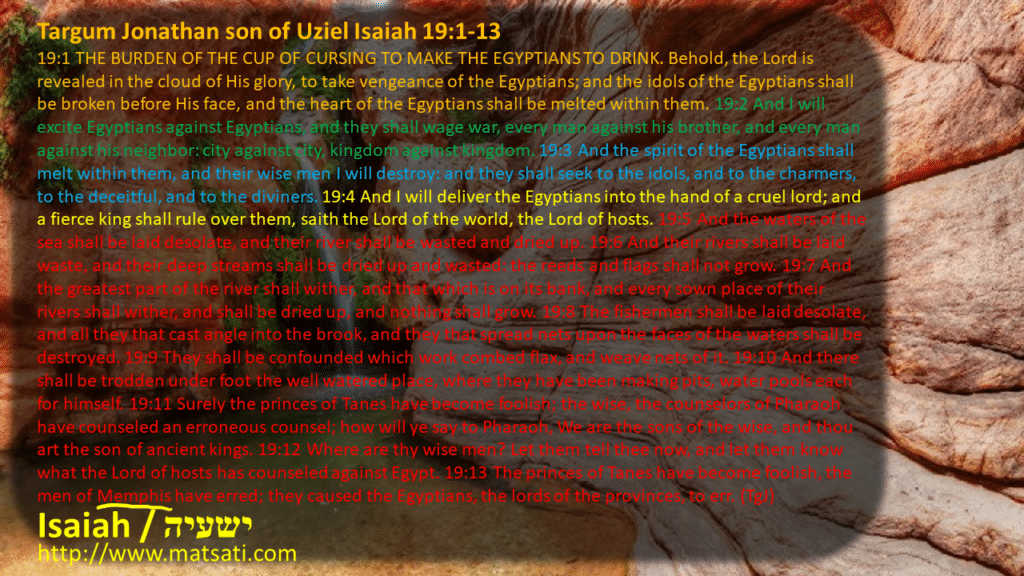
Targum Jonathan son of Uziel Isaiah 19:1-13
19:1 THE BURDEN OF THE CUP OF CURSING TO MAKE THE EGYPTIANS TO DRINK. Behold, the Lord is revealed in the cloud of His glory, to take vengeance of the Egyptians; and the idols of the Egyptians shall be broken before His face, and the heart of the Egyptians shall be melted within them. 19:2 And I will excite Egyptians against Egyptians, and they shall wage war, every man against his brother, and every man against his neighbor: city against city, kingdom against kingdom. 19:3 And the spirit of the Egyptians shall melt within them, and their wise men I will destroy: and they shall seek to the idols, and to the charmers, to the deceitful, and to the diviners. 19:4 And I will deliver the Egyptians into the hand of a cruel lord; and a fierce king shall rule over them, saith the Lord of the world, the Lord of hosts. 19:5 And the waters of the sea shall be laid desolate, and their river shall be wasted and dried up. 19:6 And their rivers shall be laid waste, and their deep streams shall be dried up and wasted: the reeds and flags shall not grow. 19:7 And the greatest part of the river shall wither, and that which is on its bank, and every sown place of their rivers shall wither, and shall be dried up, and nothing shall grow. 19:8 The fishermen shall be laid desolate, and all they that cast angle into the brook, and they that spread nets upon the faces of the waters shall be destroyed. 19:9 They shall be confounded which work combed flax, and weave nets of it. 19:10 And there shall be trodden under foot the well watered place, where they have been making pits, water pools each for himself. 19:11 Surely the princes of Tanes have become foolish; the wise, the counselors of Pharaoh have counseled an erroneous counsel; how will ye say to Pharaoh, We are the sons of the wise, and thou art the son of ancient kings. 19:12 Where are thy wise men? Let them tell thee now, and let them know what the Lord of hosts has counseled against Egypt. 19:13 The princes of Tanes have become foolish, the men of Memphis have erred; they caused the Egyptians, the lords of the provinces, to err. (TgJ)
The TgJ interprets Isaiah 19:1 with the Lord riding upon the clouds, this being the Shekhinah cloud of glory that is described in the Torah and elsewhere when God’s presence is manifested, that when the Lord shows up He will bring vengeance for Egypt’s sins. א מַטַל כָס דִלוָט לְאַשקָאָה יָת מִצרָיִם הָא יוי מִתגְלֵי בַעְנַן יְקָרֵיה לְאִתפְרָעָא מִן מִצרָאֵי וְיִתַברוּן טָעְוָת מִצרָאֵי מִן קֳדָמֹוהִי וְלִיבָא דְמִצרָאֵי יִתמְסֵי בִמעֵיהֹון׃ 19:1 THE BURDEN OF THE CUP OF CURSING TO MAKE THE EGYPTIANS TO DRINK. Behold, the Lord is revealed in the cloud of His glory, to take vengeance of the Egyptians; and the idols of the Egyptians shall be broken before His face, and the heart of the Egyptians shall be melted within them. (TgJ) Again we see this phrase מַטַל כָס דִלוָט לְאַשקָאָה יָת מִצרָיִם of the cup of cursing that the Egyptians this time is being forced to drink. We note that when Judgment comes there is no choice but to bear through it and receive the consequences of one’s sins. Judgment is brought against the idol gods of Egypt, and part of the judgment is that each Egyptian will begin to fight against his brother. The rabbis discuss the Lord coming upon the clouds according to Pirkei DeRabbi Eliezer 4:5 and Rashi on Isaiah 19:1 Parts 1-2.
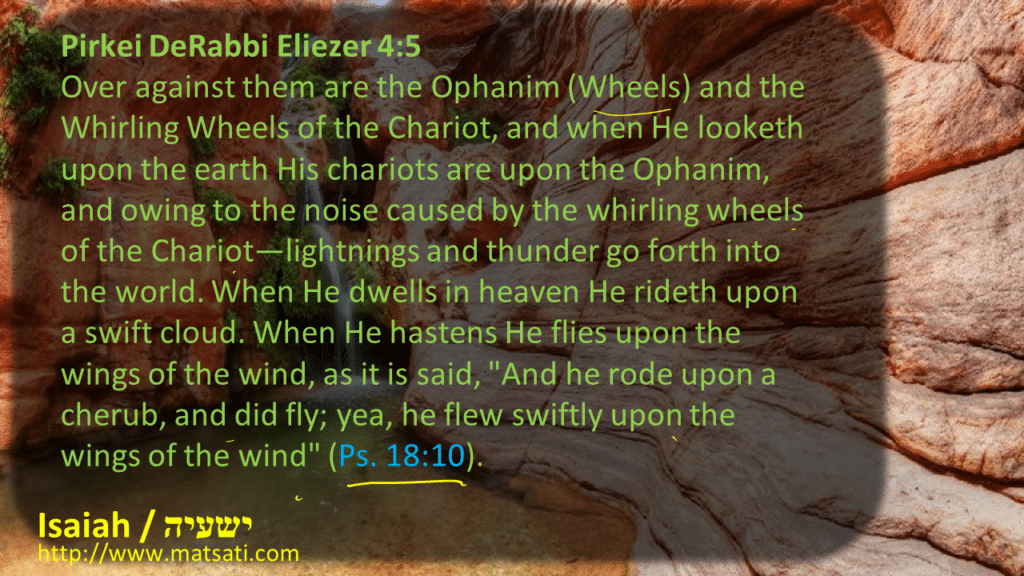
Pirkei DeRabbi Eliezer 4:5
Over against them are the Ophanim (Wheels) and the Whirling Wheels of the Chariot, and when He looketh upon the earth His chariots are upon the Ophanim, and owing to the noise caused by the whirling wheels of the Chariot—lightnings and thunder go forth into the world. When He dwells in heaven He rideth upon a swift cloud. When He hastens He flies upon the wings of the wind, as it is said, “And he rode upon a cherub, and did fly; yea, he flew swiftly upon the wings of the wind” (Ps. 18:10).
In Pierkei DeRabbi Eliezer there appears to be a connection to the book of Ezekiel 1:1-21
Ezekiel 1:1-21
1:1 Now it came to pass in the thirtieth year, in the fourth month, in the fifth day of the month, as I was among the captives by the river of Chebar, that the heavens were opened, and I saw visions of God. 1:2 In the fifth day of the month, which was the fifth year of king Jehoiachin’s captivity, 1:3 The word of the LORD came expressly unto Ezekiel the priest, the son of Buzi, in the land of the Chaldeans by the river Chebar; and the hand of the LORD was there upon him. 1:4 And I looked, and, behold, a whirlwind came out of the north, a great cloud, and a fire infolding itself, and a brightness was about it, and out of the midst thereof as the color of amber, out of the midst of the fire. 1:5 Also out of the midst thereof came the likeness of four living creatures. And this was their appearance; they had the likeness of a man. 1:6 And every one had four faces, and every one had four wings. 1:7 And their feet were straight feet; and the sole of their feet was like the sole of a calf’s foot: and they sparkled like the color of burnished brass. 1:8 And they had the hands of a man under their wings on their four sides; and they four had their faces and their wings. 1:9 Their wings were joined one to another; they turned not when they went; they went every one straight forward. 1:10 As for the likeness of their faces, they four had the face of a man, and the face of a lion, on the right side: and they four had the face of an ox on the left side; they four also had the face of an eagle. 1:11 Thus were their faces: and their wings were stretched upward; two wings of every one were joined one to another, and two covered their bodies. 1:12 And they went every one straight forward: whither the spirit was to go, they went; and they turned not when they went. 1:13 As for the likeness of the living creatures, their appearance was like burning coals of fire, and like the appearance of lamps: it went up and down among the living creatures; and the fire was bright, and out of the fire went forth lightning. 1:14 And the living creatures ran and returned as the appearance of a flash of lightning. 1:15 Now as I beheld the living creatures, behold one wheel upon the earth by the living creatures, with his four faces. 1:16 The appearance of the wheels and their work was like unto the colour of a beryl: and they four had one likeness: and their appearance and their work was as it were a wheel in the middle of a wheel. 1:17 When they went, they went upon their four sides: and they turned not when they went. 1:18 As for their rings, they were so high that they were dreadful; and their rings were full of eyes round about them four. 1:19 And when the living creatures went, the wheels went by them: and when the living creatures were lifted up from the earth, the wheels were lifted up. 1:20 Whithersoever the spirit was to go, they went, thither was their spirit to go; and the wheels were lifted up over against them: for the spirit of the living creature was in the wheels. 1:21 When those went, these went; and when those stood, these stood; and when those were lifted up from the earth, the wheels were lifted up over against them: for the spirit of the living creature was in the wheels. (KJV, וַיְהִ֣י׀ בִּשְׁלֹשִׁ֣ים שָׁנָ֗ה בָּֽרְבִיעִי֙ בַּחֲמִשָּׁ֣ה לַחֹ֔דֶשׁ וַאֲנִ֥י בְתֽוֹךְ־הַגּוֹלָ֖ה עַל־נְהַר־כְּבָ֑ר נִפְתְּחוּ֙ הַשָּׁמַ֔יִם וָאֶרְאֶ֖ה מַרְא֥וֹת אֱלֹהִֽים׃ בַּחֲמִשָּׁ֖ה לַחֹ֑דֶשׁ הִ֚יא הַשָּׁנָ֣ה הַחֲמִישִׁ֔ית לְגָל֖וּת הַמֶּ֥לֶךְ יוֹיָכִֽין׃ הָיֹ֣ה הָיָ֣ה דְבַר־יְ֠הוָה אֶל־יְחֶזְקֵ֨אל בֶּן־בּוּזִ֧י הַכֹּהֵ֛ן בְּאֶ֥רֶץ כַּשְׂדִּ֖ים עַל־נְהַר־כְּבָ֑ר וַתְּהִ֥י עָלָ֛יו שָׁ֖ם יַד־יְהוָֽה׃ וָאֵ֡רֶא וְהִנֵּה֩ ר֨וּחַ סְעָרָ֜ה בָּאָ֣ה מִן־הַצָּפ֗וֹן עָנָ֤ן גָּדוֹל֙ וְאֵ֣שׁ מִתְלַקַּ֔חַת וְנֹ֥גַֽהּ ל֖וֹ סָבִ֑יב וּמִ֨תּוֹכָ֔הּ כְּעֵ֥ין הַחַשְׁמַ֖ל מִתּ֥וֹךְ הָאֵֽשׁ׃ וּמִ֨תּוֹכָ֔הּ דְּמ֖וּת אַרְבַּ֣ע חַיּ֑וֹת וְזֶה֙ מַרְאֵֽיהֶ֔ן דְּמ֥וּת אָדָ֖ם לָהֵֽנָּה׃ וְאַרְבָּעָ֥ה פָנִ֖ים לְאֶחָ֑ת וְאַרְבַּ֥ע כְּנָפַ֖יִם לְאַחַ֥ת לָהֶֽם׃ וְרַגְלֵיהֶ֖ם רֶ֣גֶל יְשָׁרָ֑ה וְכַ֣ף רַגְלֵיהֶ֗ם כְּכַף֙ רֶ֣גֶל עֵ֔גֶל וְנֹ֣צְצִ֔ים כְּעֵ֖ין נְחֹ֥שֶׁת קָלָֽל׃ וְיָדוֹ אָדָ֗ם מִתַּ֙חַת֙ כַּנְפֵיהֶ֔ם עַ֖ל אַרְבַּ֣עַת רִבְעֵיהֶ֑ם וּפְנֵיהֶ֥ם וְכַנְפֵיהֶ֖ם לְאַרְבַּעְתָּֽם׃ חֹֽבְרֹ֛ת אִשָּׁ֥ה אֶל־אֲחוֹתָ֖הּ כַּנְפֵיהֶ֑ם לֹא־יִסַּ֣בּוּ בְלֶכְתָּ֔ן אִ֛ישׁ אֶל־עֵ֥בֶר פָּנָ֖יו יֵלֵֽכוּ׃ וּדְמ֣וּת פְּנֵיהֶם֮ פְּנֵ֣י אָדָם֒ וּפְנֵ֨י אַרְיֵ֤ה אֶל־הַיָּמִין֙ לְאַרְבַּעְתָּ֔ם וּפְנֵי־שׁ֥וֹר מֵֽהַשְּׂמֹ֖אול לְאַרְבַּעְתָּ֑ן וּפְנֵי־נֶ֖שֶׁר לְאַרְבַּעְתָּֽן׃ וּפְנֵיהֶ֕ם וְכַנְפֵיהֶ֥ם פְּרֻד֖וֹת מִלְמָ֑עְלָה לְאִ֗ישׁ שְׁ֚תַּיִם חֹבְר֣וֹת אִ֔ישׁ וּשְׁתַּ֣יִם מְכַסּ֔וֹת אֵ֖ת גְּוִיֹתֵיהֶֽנָה׃ וְאִ֛ישׁ אֶל־עֵ֥בֶר פָּנָ֖יו יֵלֵ֑כוּ אֶ֣ל אֲשֶׁר֩ יִֽהְיֶה־שָׁ֨מָּה הָר֤וּחַ לָלֶ֙כֶת֙ יֵלֵ֔כוּ לֹ֥א יִסַּ֖בּוּ בְּלֶכְתָּֽן׃ וּדְמ֨וּת הַחַיּ֜וֹת מַרְאֵיהֶ֣ם כְּגַחֲלֵי־אֵ֗שׁ בֹּֽעֲרוֹת֙ כְּמַרְאֵ֣ה הַלַּפִּדִ֔ים הִ֕יא מִתְהַלֶּ֖כֶת בֵּ֣ין הַחַיּ֑וֹת וְנֹ֣גַהּ לָאֵ֔שׁ וּמִן־הָאֵ֖שׁ יוֹצֵ֥א בָרָֽק׃ וְהַחַיּ֖וֹת רָצ֣וֹא וָשׁ֑וֹב כְּמַרְאֵ֖ה הַבָּזָֽק׃ וָאֵ֖רֶא הַחַיּ֑וֹת וְהִנֵּה֩ אוֹפַ֨ן אֶחָ֥ד בָּאָ֛רֶץ אֵ֥צֶל הַחַיּ֖וֹת לְאַרְבַּ֥עַת פָּנָֽיו׃ מַרְאֵ֨ה הָאוֹפַנִּ֤ים וּמַעֲשֵׂיהֶם֙ כְּעֵ֣ין תַּרְשִׁ֔ישׁ וּדְמ֥וּת אֶחָ֖ד לְאַרְבַּעְתָּ֑ן וּמַרְאֵיהֶם֙ וּמַ֣עֲשֵׂיהֶ֔ם כַּאֲשֶׁ֛ר יִהְיֶ֥ה הָאוֹפַ֖ן בְּת֥וֹךְ הָאוֹפָֽן׃ עַל־אַרְבַּ֥עַת רִבְעֵיהֶ֖ן בְּלֶכְתָּ֣ם יֵלֵ֑כוּ לֹ֥א יִסַּ֖בּוּ בְּלֶכְתָּֽן׃ וְגַ֨בֵּיהֶ֔ן וְגֹ֥בַהּ לָהֶ֖ם וְיִרְאָ֣ה לָהֶ֑ם וְגַבֹּתָ֗ם מְלֵאֹ֥ת עֵינַ֛יִם סָבִ֖יב לְאַרְבַּעְתָּֽן׃ וּבְלֶ֙כֶת֙ הַֽחַיּ֔וֹת יֵלְכ֥וּ הָאוֹפַנִּ֖ים אֶצְלָ֑ם וּבְהִנָּשֵׂ֤א הַֽחַיּוֹת֙ מֵעַ֣ל הָאָ֔רֶץ יִנָּשְׂא֖וּ הָאוֹפַנִּֽים׃ עַ֣ל אֲשֶׁר֩ יִֽהְיֶה־שָּׁ֨ם הָר֤וּחַ לָלֶ֙כֶת֙ יֵלֵ֔כוּ שָׁ֥מָּה הָר֖וּחַ לָלֶ֑כֶת וְהָאוֹפַנִּ֗ים יִנָּשְׂאוּ֙ לְעֻמָּתָ֔ם כִּ֛י ר֥וּחַ הַחַיָּ֖ה בָּאוֹפַנִּֽים׃ בְּלֶכְתָּ֣ם יֵלֵ֔כוּ וּבְעָמְדָ֖ם יַֽעֲמֹ֑דוּ וּֽבְהִנָּשְׂאָ֞ם מֵעַ֣ל הָאָ֗רֶץ יִנָּשְׂא֤וּ הָאֽוֹפַנִּים֙ לְעֻמָּתָ֔ם כִּ֛י ר֥וּחַ הַחַיָּ֖ה בָּאוֹפַנִּֽים׃)
In Ezekiel’s vision he sees the four living creatures upon the clouds, and then describes these chariot wheels. Ezekiel’s vision of four wheels was associated with four living creatures we can tell based upon the text that he grappled with words to try and describe what he was seeing in his vision. How to put the things he saw into human terms so that others could understand. The major concepts drawn out are how these angels traveled with lightning speed, almost instantaneously from place to place. This may be a description of the omnipresence of God, going throughout the earth and observing the behaviors and lives of men on this earth. This is connected to the phrase מַטַל כָס דִלוָט לְאַשקָאָה יָת מִצרָיִם of the cup of cursing that the Egyptians this time is being forced to drink due to their sins. We note that this is a vision God was giving Ezekiel for the purpose of sending him to the children of Israel in exile (Babylon). This follows the typical pattern of the Lord God sending prophets to His people to call them to repentance and truth and to turn from idolatry. The connection to Mitzrayim (Egypt) is interesting as the people cry out to the Lord when in bondage, but when set free, they basically just start to do whatever they want to do. The Lord sends warnings to His people via His holy Word, especially across the centuries in time through His Word, the Scriptures (the Bible). According to Acts 2:17 we read, “And it shall come to pass in the last days, said God, I will pour out my Spirit upon all flesh: and your sons and your daughters shall prophesy, and your young men shall see visions, and your old men shall dream dreams.” The idea is that today there should be more visions and dreams given from the Lord. I have had discussions with other believers concerning this in the past, and whenever I have a dream, it is basically just dismissed as a dream and nothing else. The Lord can speak to us in visions and dreams today! Consider how the Lord spoke to Laben according to Bereshit / Genesis 31:24 וַיָּבֹ֧א אֱלֹהִ֛ים אֶל־לָבָ֥ן הָאֲרַמִּ֖י בַּחֲלֹ֣ם הַלָּ֑יְלָה וַיֹּ֣אמֶר ל֗וֹ הִשָּׁ֧מֶר לְךָ֛ פֶּן־תְּדַבֵּ֥ר עִֽם־יַעֲקֹ֖ב מִטּ֥וֹב עַד־רָֽע׃ God told Laben not to say either good or bad to Jacob. Notice how Laben did not have a dismissal attitude. The dismissal attitude however may lead to one missing what the Lord is trying to say concerning these things. This is a significant thing to think about! Rashi has the following to say concerning Isaiah 19:1.
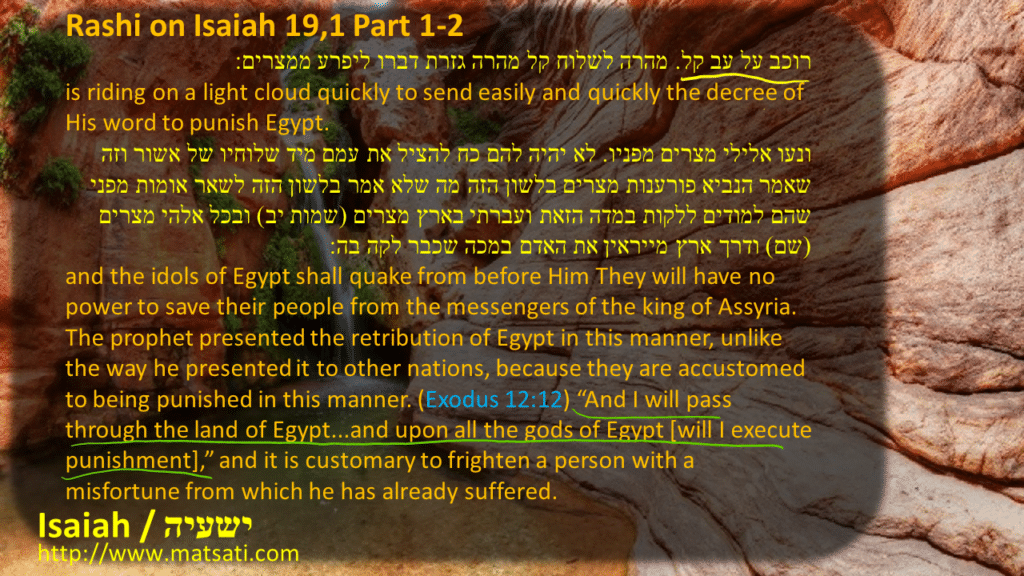
Rashi on Isaiah 19,1 Part 1-2
רוכב על עב קל. מהרה לשלוח קל מהרה גזרת דברו ליפרע ממצרים: is riding on a light cloud quickly to send easily and quickly the decree of His word to punish Egypt.
ונעו אלילי מצרים מפניו. לא יהיה להם כח להציל את עמם מיד שלוחיו של אשור וזה שאמר הנביא פורענות מצרים בלשון הזה מה שלא אמר בלשון הזה לשאר אומות מפני שהם למודים ללקות במדה הזאת ועברתי בארץ מצרים (שמות יב) ובכל אלהי מצרים (שם) ודרך ארץ מייראין את האדם במכה שכבר לקה בה: and the idols of Egypt shall quake from before Him They will have no power to save their people from the messengers of the king of Assyria. The prophet presented the retribution of Egypt in this manner, unlike the way he presented it to other nations, because they are accustomed to being punished in this manner. (Exodus 12:12) “And I will pass through the land of Egypt…and upon all the gods of Egypt [will I execute punishment],” and it is customary to frighten a person with a misfortune from which he has already suffered.
Rashi speaks of the basic inadequacy of idolatry. Israel originally trusted in Assyria, now they are trusting in Egypt, the same situation follows, the idols gods, the demonic forces that are at work will quake since they have no power to save those who place their faith in them. We note that Rashi states, “‘And I will pass through the land of Egypt…and upon all the gods of Egypt [will I execute punishment],’ and it is customary to frighten a person with a misfortune from which he has already suffered.” This is an important observation, since the Lord brings about His plans in such a way so as to be familiar to us. This means that the Lord follows certain numerical patterns through His bringing judgment upon the earth. This is something that should not be overlooked or dismissed as inconsequential. Especially in light of the events of the present day! Israel trusting in Egypt now for their salvation, the Lord in turn causes internal strife and quarreling so making the help of Egypt fall short. ב וַאְגָרֵי מִצרָאֵי בְמִצרָאֵי וִיגִיחוּן קְרָב גְבַר בַאְחוּהִי וּגבַר בְחַברֵיה קְרֵי בִקרֵי מַלכוּ בְמַלכוּ׃ 19:2 And I will excite Egyptians against Egyptians, and they shall wage war, every man against his brother, and every man against his neighbor: city against city, kingdom against kingdom. (TgJ) Yeshua said that when a kingdom fights amongst itself, it cannot stand, when he was referencing the kingdom of the evil one (Satan, Mark 3:24). It is interesting Pirkei DeRabbi Eliezer 9:4 comments seem to parallel Tehillim / Psalms 2, which provides us with a messianic expectation.
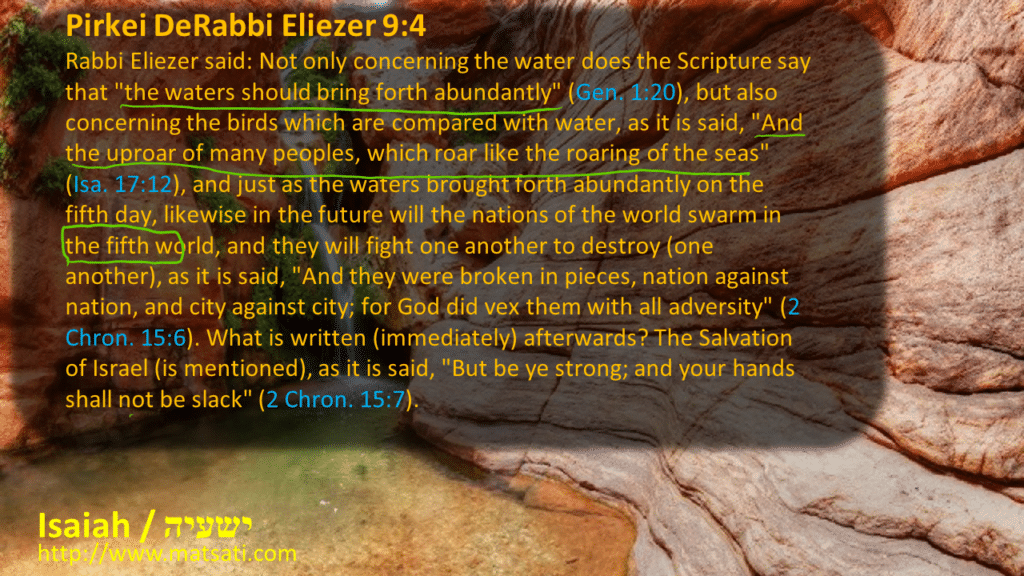
Pirkei DeRabbi Eliezer 9:4
Rabbi Eliezer said: Not only concerning the water does the Scripture say that “the waters should bring forth abundantly” (Gen. 1:20), but also concerning the birds which are compared with water, as it is said, “And the uproar of many peoples, which roar like the roaring of the seas” (Isa. 17:12), and just as the waters brought forth abundantly on the fifth day, likewise in the future will the nations of the world swarm in the fifth world, and they will fight one another to destroy (one another), as it is said, “And they were broken in pieces, nation against nation, and city against city; for God did vex them with all adversity” (2 Chron. 15:6). What is written (immediately) afterwards? The Salvation of Israel (is mentioned), as it is said, “But be ye strong; and your hands shall not be slack” (2 Chron. 15:7).
Pirkei DeRabbi Eliezer connects the idea of “And the uproar of many peoples” seems to parallel Tehillim / Psalms 2:1 “Why do the heathen rage, and the people imagine a vain thing?” According to Tehillim / Psalms 2:1-4, the raging against God and His people will lead to destruction from within, as it says in Tehillim / Psalms 2:4 “He that sitteth in the heavens shall laugh: the LORD shall have them in derision.” (KJV) This idea of derision is synonymous to causing each man to fight his brother, etc. Due to this derision, we read in the TgJ, ג וְתִתמְסֵי רוּחָא דְמִצרָאֵי בִמעֵיהֹון וְחַכִימֵיהֹון אְסַלעֵים וְיִתבְעוּן מִן טָעְוָן וּמִן חָרָשִין וּמִן בִדִין וּמִן זְכוּרוּ׃ 19:3 And the spirit of the Egyptians shall melt within them, and their wise men I will destroy: and they shall seek to the idols, and to the charmers, to the deceitful, and to the diviners. (TgJ) Regardless of what happens, the people continue seeking their idolatry. The reason being it is very difficult to depart from tradition! Take for example what the Torah and Proverbs has to say concerning tradition and children.
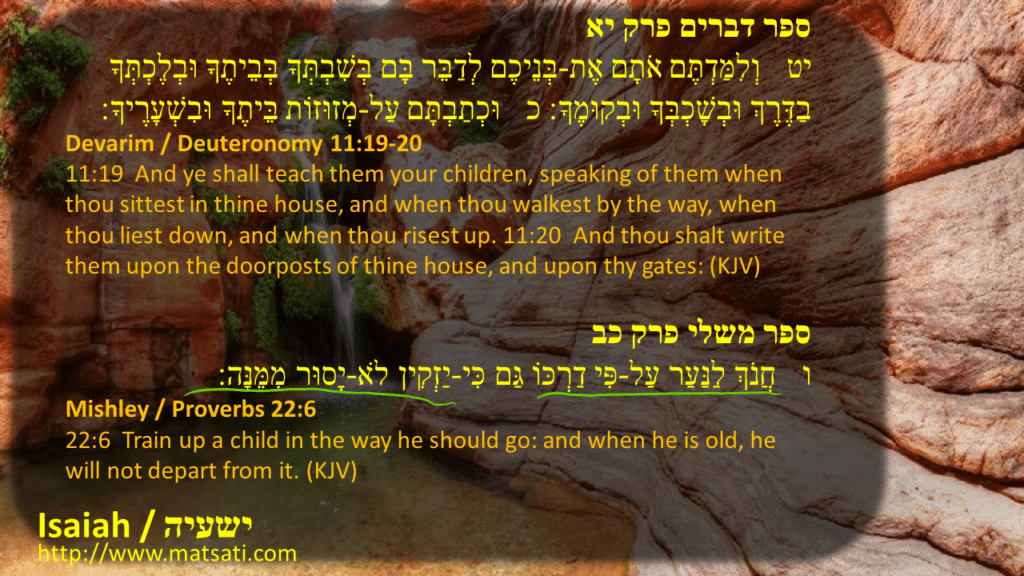
ספר דברים פרק יא
יט וְלִמַּדְתֶּם אֹתָם אֶת-בְּנֵיכֶם לְדַבֵּר בָּם בְּשִׁבְתְּךָ בְּבֵיתֶךָ וּבְלֶכְתְּךָ בַדֶּרֶךְ וּבְשָׁכְבְּךָ וּבְקוּמֶךָ: כ וּכְתַבְתָּם עַל-מְזוּזוֹת בֵּיתֶךָ וּבִשְׁעָרֶיךָ:
Devarim / Deuteronomy 11:19-20
11:19 And ye shall teach them your children, speaking of them when thou sittest in thine house, and when thou walkest by the way, when thou liest down, and when thou risest up. 11:20 And thou shalt write them upon the doorposts of thine house, and upon thy gates: (KJV)
ספר משלי פרק כב
ו חֲנֹךְ לַנַּעַר עַל-פִּי דַרְכּוֹ גַּם כִּי-יַזְקִין לֹא-יָסוּר מִמֶּנָּה:
Mishley / Proverbs 22:6
22:6 Train up a child in the way he should go: and when he is old, he will not depart from it. (KJV)
The idea is that in order to keep a child upon the righteous path one should begin at the home, very early, teaching our children of the way of God in truth, righteousness, and holiness and demonstrate what these things mean at the home meaning the parents are to live the Word of God as well as teaching these things. In Mishley / Proverbs Solomon wrote to train up a child in the way he should go and when he is old he will not depart from it. The point is that growing up with something, it becomes very familiar and we are creatures of habit. We are like things that are predictable and something that makes us feel safe and such. We are resistant to changing familiar habits. This is why the people continued to seek their idol gods regardless of what was happening to them, as their sins were generational, they were passed down from parent to child over many years. Maimonides and Rashi wrote the following concerning these things.
Guide for the Perplexed, Part 1 40:6
The meaning of “intention,” “will,” is likewise contained in the word ruaḥ. Comp. “A fool uttereth all his spirit” (ruaḥ) (Prov. 29:11), i.e., his intention and will; “And the spirit (ruaḥ) of Egypt shall fail in the midst thereof, and I will destroy the counsel thereof” (Isa. 19:3), i.e., her intentions will be frustrated, and her plans will be obscured; “Who has comprehended the spirit (ruaḥ) of the Lord, or who is familiar with his counsel that he may tell us?” (Isa. 40:13), i.e., Who knows the order fixed by His will, or perceives the system of His Providence in the existing world, that he may tell us? as we shall explain in the chapters in which we shall speak on Providence.
Rashi on Isaiah 19,3 Part 1-2
ונבקה רוח. תתרוקן חכמתו כמו (לקמן כד) בוקק הארץ: And the spirit of Egypt shall empty out Heb. וְנָבְקָה. His wisdom shall be emptied out. Comp. (infra 24:1) “Empties out (בּוֹקֵק) the land.”
האטים. א’ מן השמות של עו”ג: sorcerers Heb. הָאִטִּים, one of the names of the idols.
Maimonides writes that one’s intentions come from his רוח spirit paralleling something Solomon wrote in Mishley / Proverbs 29:11 and the present verse in Isaiah 19:3 that states וְנָבְקָה רוּחַ-מִצְרַיִם “the spirit of Egypt will be laid waste,” and וַעֲצָת֖וֹ אֲבַלֵּ֑עַ “his counsel/plan will be confused.” The reason this is so because their plans are connected to their idol and their sorcerers (Rashi). Because of this the people are led astray; they do not seek correct leadership. Note what is taking place today in governments around the world? Those who are elected as leaders are corrupt to the core and working against the people. How did these people get into office? Either by cheating their way in, or by being elected by a people who have been led astray! Just like what we are reading here in Isaiah. These things then lead to what the Lord God is saying to Egypt, ד וְאַמסַר יָת מִצרָאֵי בְיַד רִיבֹון קְשֵי וּמַלַך תַקִיף יִשלֹוט בְהֹון אְמַר רִבֹון עָלְמָא יוי צְבָאֹות׃ 19:4 And I will deliver the Egyptians into the hand of a cruel lord; and a fierce king shall rule over them, saith the Lord of the world, the Lord of hosts. (TgJ) Midrash Bamidbar Rabbah speaks to the significance of protecting what is holy and sacred in our lives.
Midrash Bamidbar Rabbah 1:3
…R’ Yehoshua be Levi said: If the nations of the world knew how good the Holy Temple was for them, they would surround it with fortifications in order to guard it. It was better for them than it was for Israel, just as Shlomo ordered his prayer “And also to the stranger, who is not of Your people Israel…” (Kings I 8:41 and it is written “…and do according to all that the stranger calls You for…” (Kings I 8:43) But when it comes to Israel, what is written? “…and give to each man according to his ways, whose heart You know…” (Chronicles II 6:30) If it was appropriate, He would give, and if not He would not. Don’t say that (they should value) the Holy Temple. Rather, if it were not for Israel the rain would not fall and the sun would not shine, because in their merit the Holy One brings plenty to His world. In the world to come the nations of the world will see how the Holy One is with Israel and they will come to cleave to them, as it says “In those days, when ten men of all the languages of the nations…” (Zechariah 8:23)
The idea being put forward here according to the Midrash was to fortify and guard the holy sanctuary in Jerusalem. The point may be paralleled to our lives, our bodies being a holy sanctuary of the רוח of God and by doing this we meditate upon the Word of God daily, keeping and guarding our hearts and minds from evil. We note how the Midrash groups together prayer, and each man is rewarded for his ways. This leads to the importance of ordering our lives according to His holy Word in the Bible.
Isaiah continues saying according to TgJ, ה וִיצַדֹון מַיָא מִיַמָא וְנַהרְהֹון יִחרוּב וְיִיבַש׃ 19:5 And the waters of the sea shall be laid desolate, and their river shall be wasted and dried up. ו וִיצַדֹון נַהרָוָותָא יִיבְשוּן וְיִחרְבוּן נַהרֵיהֹון עַמִיקַיָא קְנֵי וְגֹומַא לָא יִסְקוּן׃ 19:6 And their rivers shall be laid waste, and their deep streams shall be dried up and wasted: the reeds and flags shall not grow. ז יִיבַש רוּבֵיה דְנַהרָא וִיהֵי כְכֵיפֵיה וְכָל בֵית מִזרַע נַהרְהֹון יִיבַש יִחרוּב וְלָא יְצַמַח׃ 19:7 And the greatest part of the river shall wither, and that which is on its bank, and every sown place of their rivers shall wither, and shall be dried up, and nothing shall grow. ח וִיצַדֹון צַיָידֵי נוּנַייָא וְיִתאַבְלוּן כָל דַהְוֹו רָמַן בְנַהרָא חַכְתָא וּפָרְסֵי מְצָדַן עַל אַפֵי מַיָא יִצדֹון׃ 19:8 The fishermen shall be laid desolate, and all they that cast angle into the brook, and they that spread nets upon the faces of the waters shall be destroyed. (TgJ) These things describe the outcome of walking away from God’s ways. The Egyptians in their idolatry for generations even from the time of God revealing Himself to Egypt in the Exodus, the people and the generations forgot who He was. Isaiah continues according to the TgJ, ט וְיִבַהתוּן פָלְחֵי כִיתָנָא דְסָרְקִין וּמָחַן מִנֵיה מְצָדַן׃ 19:9 They shall be confounded which work combed flax, and weave nets of it. י וִיהֵי אְתַר בֵית שָתֵי מַהָא כְבִישִין אְתַר דַהְוֹו עָבְדִין סִיכְרָא וְכָנְשִין מַיָא גְבַר לְנַפשֵיה׃ 19:10 And there shall be trodden under foot the well watered place, where they have been making pits, waterpools each for himself. יא בְרַם אִיטְפַשוּ רַברְבֵי טַאְנֵיס חַכִימַיָא דְמַלכוּהִי לְפַרעֹה מֵילַך דְטָעוּ אֵיכְדֵין תֵימְרוּן לְפַרעֹה בְנֵי חַכִימִין אְנַחנָא וְאַת בַר מַלכִין דְמִילְקַדמִין׃ 19:11 Surely the princes of Tanes have become foolish; the wise, the counsellors of Pharaoh have counselled an erroneous counsel; how will ye say to Pharaoh, We are the sons of the wise, and thou art the son of ancient kings. יב אָן אִינוּן חַכִימָך וִיחַוֹון כְעַן לָך וְיִדְעוּן מָא מְלַך יוי צְבָאֹות עַל מִצרָיִם׃ 19:12 Where are thy wise men? Let them tell thee now, and let them know what the Lord of hosts has counselled against Egypt. יג אִיטְפַשוּ רַברְבֵי טַאְנֵיס טְעֹו אְנָש מַפֵיס אַטעִיאוּ יָת מִצרָיִם רַבָנֵי פִלכַהָא׃ 19:13 The princes of Tanes have become foolish, the men of Memphis have erred; they caused the Egyptians, the lords of the provinces, to err. (TgJ) Ibn Ezra states the following concerning Isaiah 19:12.
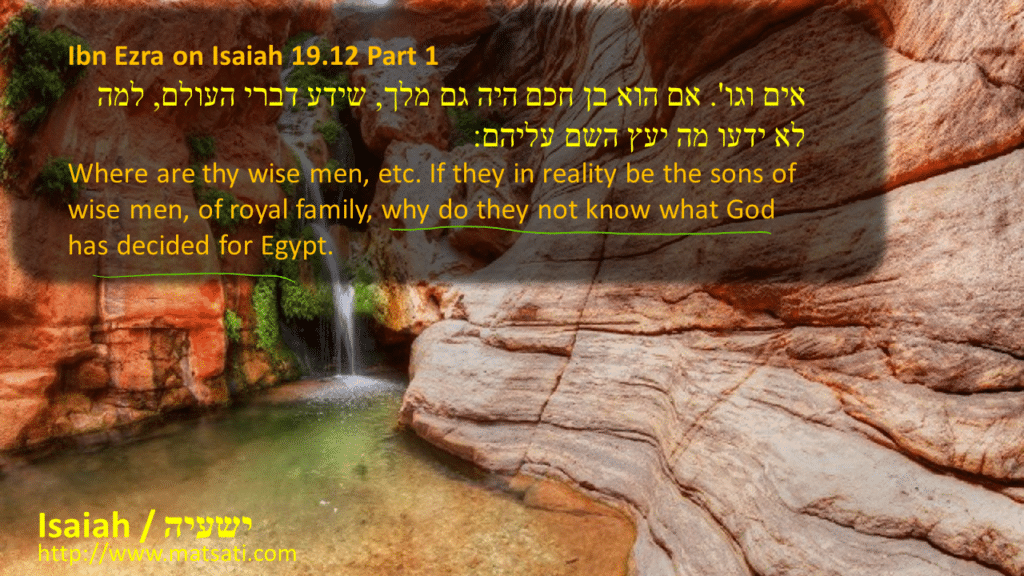
Ibn Ezra on Isaiah 19.12 Part 1
אים וגו’. אם הוא בן חכם היה גם מלך, שידע דברי העולם, למה לא ידעו מה יעץ השם עליהם:
Where are thy wise men, etc. If they in reality be the sons of wise men, of royal family, why do they not know what God has decided for Egypt.
Ibn Ezra draws out an important point concerning deception. This reminds us of Paul when we take this in the context of what Isaiah is saying. Paul wrote according to Galatians 6:7-9 Do not be deceived: God is not mocked, for whatever one sows, that will he also reap. For the one who sows to his own flesh will from the flesh reap corruption, but the one who sows to the Spirit will from the Spirit reap eternal life. And let us not grow weary of doing good, for in due season we will reap, if we do not give up. (ESV) we note that these men of Egypt are said to be descents of the wise men or of kings. Knowing the false gods they serve and their religious practices, these men sow to the spirit of a foreign god. The idea of sowing and reaping is exactly what we are seeing taking place here in the idea that if they were wise men why didn’t they know what God has decided about Egypt? Deception is meant to fool a person into thinking the lie is true. When men set their hearts to gain the wisdom of the world, or as the Egyptian magician gaining wisdom in some dark occult knowledge, is there even a possibility such a person could come to the truth? In Matthew 24:4, Yeshua warns, “Watch out that no one deceives you.” This suggests that anyone may be deceived and leads to the truth of Shomer Mitzvah Shomer Nafsho. The idea here is “He who keeps the commandment keeps his soul.” This is very meaningful for us today! For example, in Parshiot Acharei Mot and Kedoshim these Torah portions speak on incest, homosexuality, bestiality, creating graven images (idols), not to practice witchcraft, or consult mediums, etc. It is interesting how our culture today embraces all of these things. The significant take-away from these things is that by obeying, observing, keeping the commandments of God we keep our souls and are able to discern the truth from a lie!
